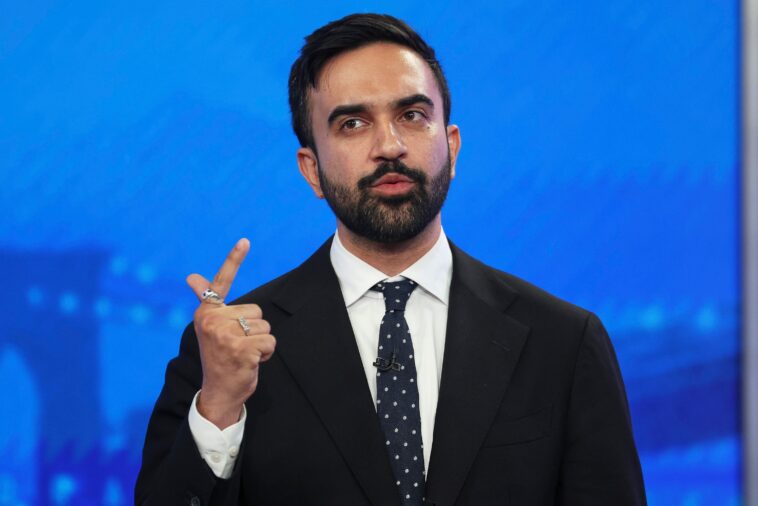The startling success of Zohran Mamdani in the recent New York City Democratic Mayoral primary is creating ripples in the political spectrum. One may wonder if Mamdani’s victory is demonstrating the might of the progressive wing in the Democratic Party. However, it could also be a one-time event, resulted from circumstances unique to this particular election and potentially unreplicable elsewhere.
Looking at California, a state where the progressive movement has seen a series of rejections lately, will Mamdani’s triumph inspire a resurgence? The legitimacy of these queries is underpinned by valid arguments on both sides. It’s worth noting that Mamdani’s victory was not marginal; with 56% of the final vote, he trounced competitors, including the former Governor Andrew Cuomo.
Mamdani, a 33-year-old state Assemblyman, pulled off a victory with an exceptionally diverse backing, securing votes from the Asian (+15), Hispanic (+6), and White (+5) communities as per the analysis. With a clever use of social media, his win provides a model for other progressive candidates. Progressives nationwide are finding their strength bolstered by this victory.
However, there are arguments that suggest this win could be a matter of right place, right time rather than proving the broad appeal of progressives. Cuomo, Mamdani’s prominent adversary, was seen as a flag-bearer of the Democratic establishment, at a time when a staggering 69% of voters perceive the establishment as being ‘out of touch,’ according to survey data.
New York City, with its quirks and unique characteristics, provided fertile ground for Mamdani, conditions not necessarily replicable in other regions. The effects of his victory, and how it impacted the progression of progressives, will be profoundly influenced by how he governs. Policies that lead to financial hardship, mass exodus of resources, or breach in public safety could swiftly dampen enthusiasm for progressive leadership.
On the flip side, if a backlash against certain policies arises, it could potentially act as a stimulus for the progressive movement. The fall-out from Mamdani’s win extends to the likely implications for the progressive stance in California. The potentially rippling impact of his victory may foster ambitions for a far-left candidate to leave an imprint on the imminent gubernatorial elections in California.
California, with its hefty contribution to the Democratic vote bank, has seen a decline in the clout of progressives but Mamdani’s win has sparked fresh hopes. But there are signals that Californians may still be resistant to the idea of progressive governance.
Case in point being the recall of District Attorney Chesa Boudin just three years ago due to growing unrest with certain policies. Adding to that, the election of Daniel Lurie, a centrist Democrat, as the city’s mayor last year indicates a shift towards more moderate politics. The 2024 election also showcased Californians’ noticeable shift to the right.
The citizens of the state also voted in favor of Prop 36, supporting stringent crime laws. Looking at the line-up for the California gubernatorial race, none of the announced candidates seem to be as uncompromisingly to the left as Mamdani.
However, Kamala Harris might shake things up. Despite leading most polls, one question remains – will Harris run? If Harris decides not to participate, this could potentially pave the way for a progressive candidate.
Arguably, her position on political matters has been rather unsatisfactory and not everything she stands for resonates with the citizens. Her past decisions have often been viewed as misguided and her stance has led to questions about the direction in which she wants to lead the party and nation as a whole.
Under her leadership, it’s predicted there could be a potential increase in taxes that might harm economic growth, fostered by policies not necessarily in the best interest of the general public. This situation creates a shadow of uncertainty over the Democratic Party’s future under her leadership.
To conclude, the Democratic Party is confronted with a pressing issue, a growing modern faction fighting for influence against the more traditional and politically reliable moderate wing. The impact of Mamdani’s victory on this friction remains to be discerned.
It is equally important to highlight the possible pitfalls of a move towards more leftist ideals. Past experiences have shown that such shifts can lead to a breakdown in law and order and increase economic strain on citizens. This serves as a warning sign to tread carefully when analyzing the impact of a potential shift of political power in the light of Mamdani’s victory.
The presumed preference for more radical policies could potentially lead to a tension between the needs of the citizens and the ideological convictions of the party’s leadership. Therefore, while some may celebrate Mamdani’s victory as a win for the progressive wing, a further analysis might suggest caution towards extrapolating this win for wider progressive dominance.
In short, the result of this one mayoral primary in New York City, albeit significant, may not indicate a significant shift in the national perception of the Democratic Party’s direction. The poise with which the Democratic Party treads this path will significantly shape their future and the impact on the American political landscape.

